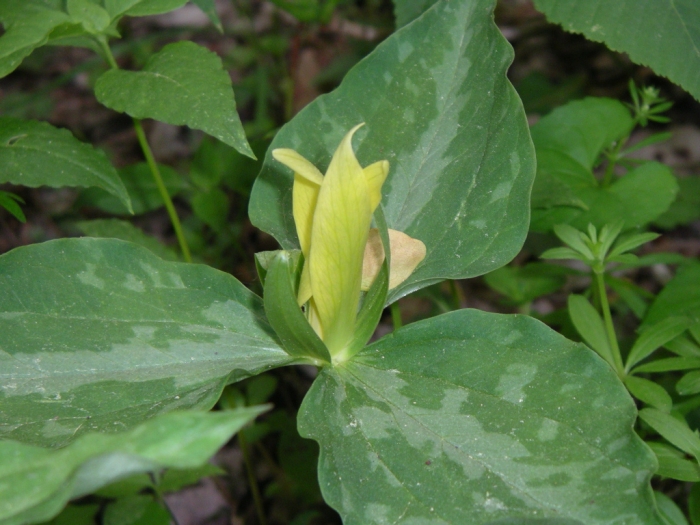Yellow Trillium
(Trillium luteum)
Yellow Trillium (Trillium luteum)
/
/

User:Halpaugh
Public domain
Image By:
User:Halpaugh
Recorded By:
Copyright:
Public domain
Copyright Notice:
Photo by: User:Halpaugh | License Type: Public domain | License URL: https://creativecommons.org/public-domain/ | Uploader: Stefan2 | Publisher: Wikimedia Commons | Title: Trillium_luteum_2.jpg | Notes: |



















































Estimated Native Range
Summary
Trillium luteum, commonly known as Yellow Trillium, is a deciduous perennial herb native to rich, mesic deciduous forests in the Southeastern United States. It typically grows to 40 cm (16 in) tall by 30 cm (12 in) wide. The plant features mottled green leaves and upright, lemon yellow flowers that are notably fragrant, blooming in spring. After the flowering period and seed set, it enters a dormant phase during the summer, reemerging in late winter. The showy blooms and the plant’s ability to form extensive colonies over time make it a desirable addition to shade gardens.
Yellow Trillium is valued for its distinctive, scented yellow flowers and its ability to naturalize in suitable conditions, creating a carpet-like effect in woodland gardens. It is often used in shaded border plantings, as a ground cover under deciduous trees, or in naturalized areas. While it can be a challenge to cultivate, requiring a sheltered location with rich, moist, well-draining leaf mold, it is a rewarding plant for the experienced gardener. It thrives in part shade to full shade and prefers medium water. It has earned the Royal Horticultural Society’s Award of Garden Merit, indicating its exceptional qualities in garden settings. Care should be taken to avoid disturbing established colonies, as they are best left undisturbed to thrive.CC BY-SA 4.0
Yellow Trillium is valued for its distinctive, scented yellow flowers and its ability to naturalize in suitable conditions, creating a carpet-like effect in woodland gardens. It is often used in shaded border plantings, as a ground cover under deciduous trees, or in naturalized areas. While it can be a challenge to cultivate, requiring a sheltered location with rich, moist, well-draining leaf mold, it is a rewarding plant for the experienced gardener. It thrives in part shade to full shade and prefers medium water. It has earned the Royal Horticultural Society’s Award of Garden Merit, indicating its exceptional qualities in garden settings. Care should be taken to avoid disturbing established colonies, as they are best left undisturbed to thrive.CC BY-SA 4.0
Plant Description
- Plant Type: Herb
- Height: 1-1.5 feet
- Width: 1-1.5 feet
- Growth Rate: Slow
- Flower Color: Yellow
- Flowering Season: Spring
- Leaf Retention: Deciduous
Growth Requirements
- Sun: Part Shade, Full Shade
- Water: Medium
- Drainage: Medium
Common Uses
Bee Garden, Butterfly Garden, Deer Resistant, Fragrant
Natural Habitat
Rich, mesic deciduous forests
Other Names
Common Names: Wax Trillium, Yellow Toadshade, Yellow Wakerobin, Trille Jaune, Gult Treblad
Scientific Names: , Trillium luteum, Trillium cuneatum var. luteum, Trillium viride var. luteum, Trillium hugeri f. flavum, Trillium sessile var. luteum, Trillium sessile f. luteum, Trillium underwoodii var. luteum,
GBIF Accepted Name: Trillium luteum (Muhl.) Harb.